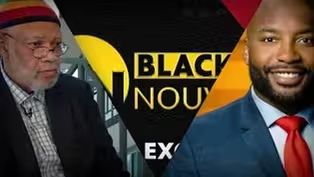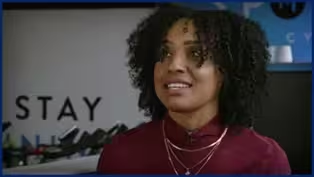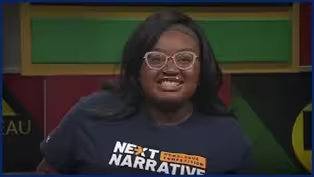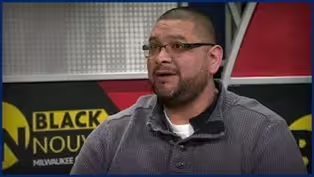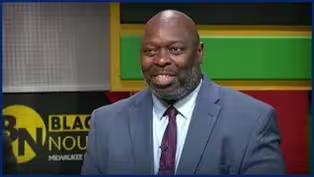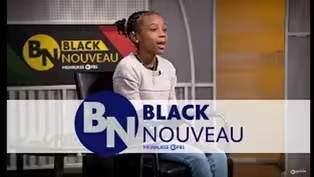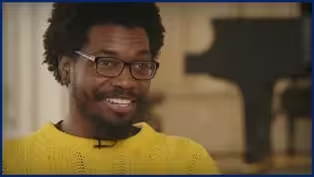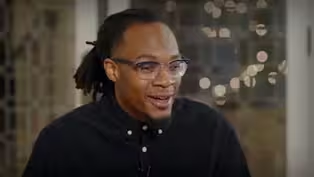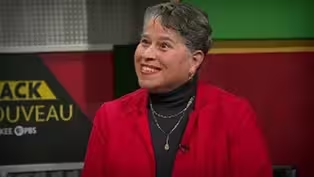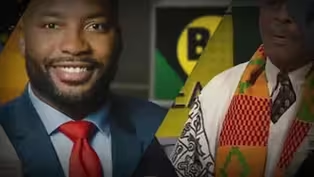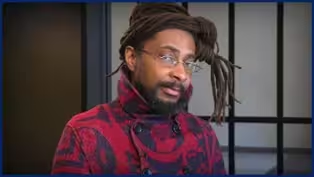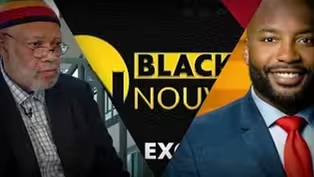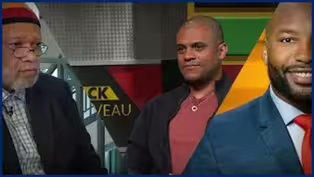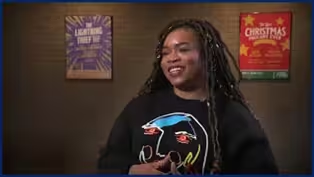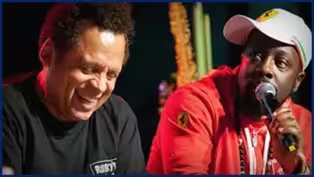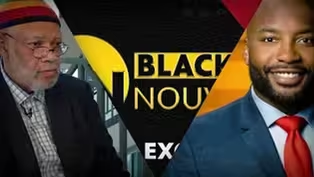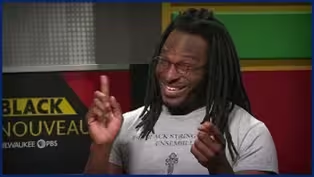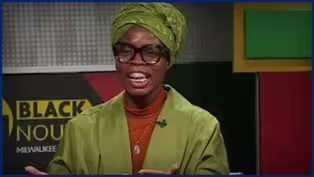Black Nouveau
Kaukauna and King
Clip: Season 32 | 6m 52sVideo has Closed Captions
Former Black Nouveau host Joanne Williams discusses her documentary
Former Black Nouveau host Joanne Williams discusses her documentary which will air at a later date on Milwaukee PBS.
Problems playing video? | Closed Captioning Feedback
Problems playing video? | Closed Captioning Feedback
Black Nouveau is a local public television program presented by MILWAUKEE PBS
This program is made possible in part by the following sponsors: Johnson Controls.
Black Nouveau
Kaukauna and King
Clip: Season 32 | 6m 52sVideo has Closed Captions
Former Black Nouveau host Joanne Williams discusses her documentary which will air at a later date on Milwaukee PBS.
Problems playing video? | Closed Captioning Feedback
How to Watch Black Nouveau
Black Nouveau is available to stream on pbs.org and the free PBS App, available on iPhone, Apple TV, Android TV, Android smartphones, Amazon Fire TV, Amazon Fire Tablet, Roku, Samsung Smart TV, and Vizio.
Providing Support for PBS.org
Learn Moreabout PBS online sponsorshipit was an experiment in race relations that would define norms and change lives not everyone agreed with the idea white students from kakana Wisconsin and black students in Milwaukee step into unknown worlds to live and perform a controversial play this was an opportunity to look at life differently now they reunite to reflect and watch as a new generation reprises their performance The Exchange kakana and King 50 years later [Music] that's a segment from The Exchange kak and King 50 years later produced by our very own Joanne Williams former host of black newvo and a journalist and reporter in Milwaukee for a number of years prior to that but you're here now and it's so good to have you here on PBS black new V thank you very much for inviting me all right so first off just talk about why you wanted to create this film in this documentary because uh I knew about the story I'd had in the back of my mind in the back of my files for more than 50 years and I just never did anything about it until one day I was cleaning out my garage found a newspaper High School newspaper and it said 1966 and this was in 2016 and I said this was 50 years ago and I know this is a good story so I'm going to tell it Y and surely you know how to find a good story so uh what's the reception been like you have two communities obviously impacted kakana and the Rufus King community so talk about what the story's been like for them and even folks beyond that well you know I haven't gotten that much response from the Rufus King Community we screened there and we had some technical difficulties so it didn't go that well but when we went up to kakana about a year ago when I was on tour with the film uh we had a big turnout we had almost 300 people come to see the film who had not seen it before and they were all very happy with it had lots of questions wanted to talk to me about it so I'm very had glad with the reception I got from kakona what's been the biggest uh surprise as far as that reception or what people saw from the film like what's been the I guess biggest surprise that you've seen from it well people always tend to ask about their High School experience which is what I wanted them to do I wanted them to turn to the person in the audience and say what was your high school experience like was it like anything you saw in the film um I had people ask me all sorts of questions about how I did the film how I found the people who were in the film it took me almost three and a half years to find people from 50 years earlier to put in the film um they want to know if I think anything has changed in the United States in the 50 years between 66 and 16 and I said not much but things are changing so I've had all sorts of questions come after the film and I enjoy all of them is that is that what people see in the film what have uh what are people going to see or what have people seen uh when they watch it they're going to see uh a group of high school students who took this adventure to go to a different Community Live with families there that they had never met before and then come from Kaka down to Milwaukee to live with families that they really didn't know and this Exchange took two months and they produced this play the play was called in White America and the play went very well and the exchange went very well which is something I didn't expect it went off without very much conflict considering it happened in 1966 I was going to ask just considering kind of the political climate there um yeah no no conflict that really is surprising but what was there was there camaraderie was there uh folks getting along just what were those relationships like the kids who were in The Exchange got along very well um they got to know each other they lived with each other other's families some of the people kept in touch with each other over the years uh some of them saw each other again when they went to college so they became friends now the people around the kids who were in The Exchange didn't get as close as the kids who were in The Exchange I refer to them as kids because they were kids back then kids back then absolutely and so was I because I was there when it happened oh yeah oh yeah so uh there film is uh going to be on PBS here this month but you're going to have this film other places too so talk about where this film is and you know where you're taking it uh well it's on the uh Film Festival circuit it's been it premiered at the Milwaukee film festival in 2022 it's been in uh now 12 festivals it's either been won or nominated in eight festivals best documentary best true story um it's it's most recent Festival I've been nominated in that one too so we'll see what happens about that but it's interesting when I take the film to festivals around the country and people in California and see it and people in Iowa and people in in Wisconsin uh they look at it a little differently they ask me different kinds of questions which I find fascinating I had one woman ask me if I thought the film was dangerous and I said why she said well I didn't know what it was about until I saw it I said did you think it was dangerous she said no I didn't but I wasn't sure before I saw it well just out of curiosity because the film's not dangerous obviously um you don't think much has changed those since then so what do you hope people get from it or what do you hope people learn from that exchange to now what do you hope changes I hope they learn that the only way we can solve problems of race in the United States is to get to know people personally to get to know people oneon-one because that's the way you change minds and you can do a lot of that through ART which is what they did in the film they were in a play called in White America and the film is also art so by watching the film you can get to see what happened with this exchange and maybe that'll get you thinking maybe I should talk to someone that doesn't look like me that I don't know very well and not feel uncomfortable asking questions and listening listening is most important listen to what people say and that's how you get to know people and that's how as they say in the film barriers drop amen thank you so much Joan for being here on black newo you're welcome
Video has Closed Captions
Clip: S32 | 6m 22s | Souls To The Polls 2024 (6m 22s)
Recovering from Disordered Eating
Video has Closed Captions
Clip: S32 | 6m 26s | Recovering from Disordered Eating (6m 26s)
Video has Closed Captions
Clip: S32 | 6m | Wisconsin has the highest Black incarceration rate in the country. (6m)
Video has Closed Captions
Clip: S32 | 6m 3s | James Causey speaks with w Black Milwaukee Republican (6m 3s)
MLK Speech Writing Contest Winner Zaida Smith
Video has Closed Captions
Clip: S32 | 6m 32s | The 40th Annual MLK Speech Writing Contest Winner - Zaida Smith (6m 32s)
Video has Closed Captions
Clip: S32 | 6m 40s | Alexandria Mack profiles Mikhail Johnson, a Jamaican composer (6m 40s)
Video has Closed Captions
Clip: S32 | 7m 57s | January 2023 Edition of "Black Nouveau features a profile of Milwaukee native Malik Johnson (7m 57s)
Video has Closed Captions
Clip: S32 | 6m 52s | Former Black Nouveau host Joanne Williams discusses her documentary (6m 52s)
The importance of organ donation
Video has Closed Captions
Clip: S32 | 7m 47s | The importance of organ donation (7m 47s)
Video has Closed Captions
Clip: S32 | 4m 54s | Gospel Rapper Rael The Artist (4m 54s)
Black Diaspora Symphony Orchestra
Video has Closed Captions
Clip: S32 | 6m 29s | Dayvin Hallmon believes that music can both create and heal communities. (6m 29s)
Black Diaspora Symphony Orchestra
Video has Closed Captions
Clip: S32 | 6m 29s | Dayvin Hallmon believes that music can both create and heal communities. (6m 29s)
Video has Closed Captions
Clip: S32 | 7m 26s | In honor of Women’s History Month, BLACK NOUVEAU features a profile on artist Della Wells. (7m 26s)
Providing Support for PBS.org
Learn Moreabout PBS online sponsorshipSupport for PBS provided by:
Black Nouveau is a local public television program presented by MILWAUKEE PBS
This program is made possible in part by the following sponsors: Johnson Controls.
